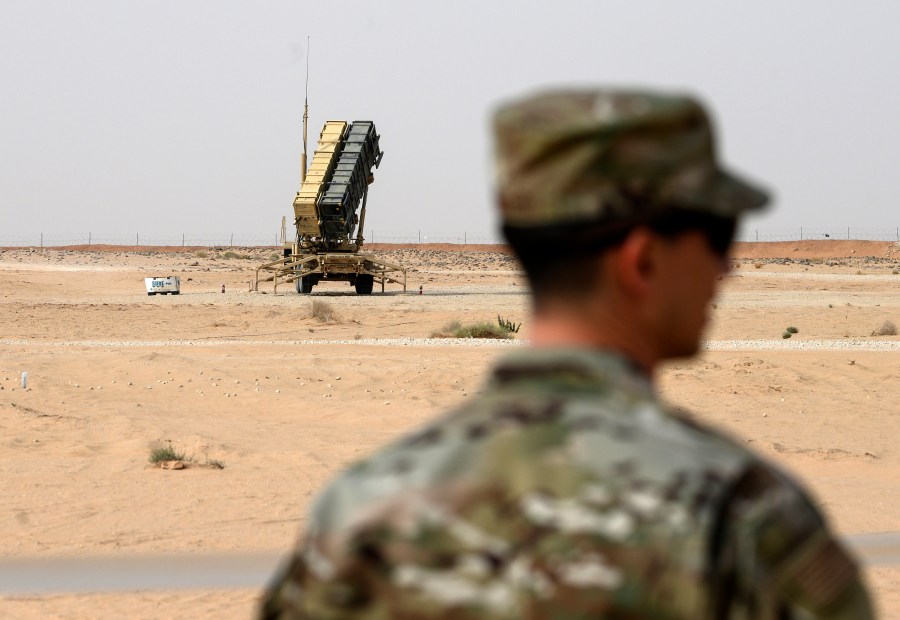TEHRAN, Iran (NewsNation Now) — Due to heightened tensions in Iran, the U.S. military is exploring the possibility of new bases in Saudi Arabia, while Iran warned the Biden administration that it will not have an indefinite time period to rejoin the nuclear deal between Tehran and world powers.
Iran also said it expects Washington to swiftly lift the economic sanctions that former President Donald Trump brought back in 2018 after pulling America out of the nuclear pack Iran had with world powers, set in 2015, to limit its nuclear program.
Among the repercussions of the economic sanctions was the hampering of Iran’s ability to fight against the COVID-19 pandemic. While the sanctions formally exempt food, medicine and other humanitarian supplies, many foreign banks have been deterred from doing business with Iran.
The remarks Tuesday by Iran’s Cabinet spokesman Ali Rabiei are part of pressure that Tehran is trying to exert on the U.S. as it seeks to increase its leverage and get the Biden administration to quickly return to the nuclear deal.

He also threatened that Iran would block short-notice “restriction” on inspections of Iran’s nuclear facilities by the United Nations atomic watchdog agency due in February if Washington did not lift sanctions.
“Since (Biden’s) administration claims not to be anti-science like the previous one …, one expects it to free the transfer of Iran’s own foreign exchange resources to fight the coronavirus and for health and food, and lift banking sanctions quickly,” Rabiei told state television.
Tehran also said it had approved Russia’s Sputnik V coronavirus vaccine for domestic use, and that it was trying to buy vaccines from overseas, including from AstraZeneca but made no reference to the Anglo-Swedish company’s British ties.
Supreme Leader Ayatollah Ali Khamenei, Iran’s top authority, has banned the government from importing U.S. and British-made vaccines, which he said were unreliable and may be used to spread the infection to other nations.
Though Biden has pledged to return to the nuclear deal, Rabiei said there has yet to be any communication between Iran and Biden on the subject.
“The U.S. will not have all the time in the world,” Rabiei said. “We are waiting for the official announcement of their stance as well as the lifting of sanctions.”
“The window of opportunity will not be open forever, either for the U.S. or the European members of the nuclear deal to fulfill their commitments,” Rabiei added.
Tensions between Tehran and Washington have steadily increased. During Trump’s final days as president, Tehran seized a South Korean oil tanker and begun enriching uranium closer to weapons-grade levels, while the U.S. has sent B-52 bombers, the USS Nimitz aircraft carrier and a nuclear submarine into the region.
Iran has also increased its military drills, including firing cruise missiles as part of a naval drill in the Gulf of Oman this month.
The U.S. military is exploring the possibility of using a Red Sea port in Saudi Arabia and an additional two airfields in the kingdom amid heightened tensions with Iran, the military said Tuesday.

While describing the work as “contingency” planning, the U.S. military said it already has tested unloading and shipping cargo overland from Saudi Arabia’s port at Yanbu, a crucial terminal for oil pipelines in the kingdom.
Using Yanbu, as well as air bases at Tabuk and Taif along the Red Sea, would give the American military more options along a crucial waterway that has come under increased attack from suspected mine and drone boat attacks by Yemen’s Iranian-backed Houthi rebels.
However, the announcement comes as Saudi-American relations remain strained by the 2018 killing of Washington Post columnist Jamal Khashoggi and the kingdom’s ongoing war in Yemen in the first days of President Joe Biden’s administration. Deploying — even temporarily — American troops to bases in the kingdom, which is home to the Muslim holy city of Mecca, could possibly reignite anger among extremists.
U.S. Navy Capt. Bill Urban, a spokesman for Central Command, said the evaluation of the sites had been going on for over a year, sparked by the September 2019 drone-and-missile attack on the heart of the Saudi oil industry.
Saudi Arabia and the U.S. have blamed that attack, which temporarily halved Saudi oil production and saw a spike in oil prices, on Iran. Tehran has denied being involved and the Houthis claimed the assault, though the drones involved appear to be Iranian-made.
Iran has missile capability of up to 1,250 miles, far enough to reach Israel and U.S. military bases in the region. Last January, after the U.S. killed a top Iranian general in Baghdad, Tehran retaliated by firing a barrage of ballistic missiles at two Iraqi bases housing U.S. troops, resulting in brain concussion injuries to dozens of American soldiers.
In a separate development Tuesday, Iranian state TV said Iran successfully tested sophisticated technology for light-based data transfer — known in science as entanglement-based secure quantum cryptography — at a distance of 1 mile in the capital, Tehran. The technology is expected to allow for a secure way of sharing secret information between remote users.
The country’s nuclear department chief, Ali Akbar Salehi, said Iranian experts embarked on the encryption technology, which only a few in the world have mastered so far, in 2018 and hope to use it in satellite communications by 2025.
Occasionally Iran announces technological achievements that cannot be independently verified.
The Associated Press contributed to this article: reporting by Nasser Karimi and Jon Gambrell. Reuters’ Dubai newsroom contributed to this article.

